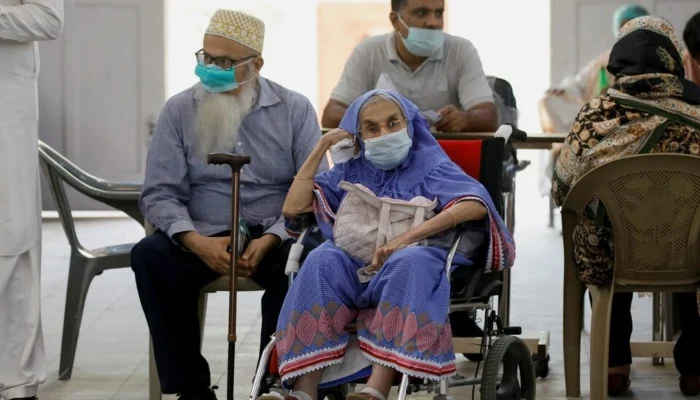At least four individuals, predominantly elderly with compromised immune systems and pre-existing health conditions, have succumbed to Covid-19 in Karachi amidst a noticeable surge in cases over the past two weeks. Officials and infectious disease experts confirmed this development on Thursday, as reported by The News.
All reported fatalities occurred at Aga Khan University Hospital (AKUH), which has observed a consistent increase in Covid-19 admissions. This trend has been described by experts as “unusual” for this particular time of year.
Professor Dr. Syed Faisal Mahmood, an infectious diseases specialist at AKUH, stated that the hospital has been experiencing a continuous influx of Covid patients. “And we’re seeing patients getting hospitalised daily with Covid-19.”
Describing the current wave as “odd,” Dr. Mahmood noted that as a respiratory illness, Covid typically sees higher transmission during winter months. However, this time, cases are escalating even as the city experiences daytime temperatures exceeding 40°C.
“It’s a flu-like infection, and its spikes are usually seen in winter. However, this year we’re witnessing a midsummer rise, which is not something we usually expect.” Reassuring the public, he emphasized that while the virus is circulating, it primarily causes mild, flu-like symptoms among healthy individuals.
He advised those experiencing symptoms such as sore throat, cough, runny nose, and fever to wear a mask, avoid gatherings, and consult a healthcare provider for symptomatic treatment.
“People with high-risk conditions, the elderly, and pregnant women should remain cautious. Individuals with high-risk conditions such as those over 65 or with low immunity should get tested so that treatment can be initiated early.”
Dr. Javed Khan, a specialist in respiratory diseases, shared that 8 to 10 patients presenting with COVID-19 symptoms are arriving daily at a private hospital. “Since last week, 8 to 10 positive cases of COVID-19 are being observed daily,” Dr. Khan stated.
He further added: “COVID-19 cases are being reported worldwide, and many patients have a travel history.” Dr. Khan offered reassurance that the condition of patients admitted to the hospital is improving, and there is no immediate cause for concern. He listed common COVID-19 symptoms as fever, cough, cold, and body aches, noting that many patients also experience difficulty breathing.
Dr. Khan stressed that citizens should implement precautionary measures, including thorough hand washing with soap. He advised immediate testing if the severity of fever or cough increases. According to hospital authorities, Dow Hospital is also receiving 8 to 10 patients daily with COVID-19 symptoms.
Other healthcare facilities in the city, including the Sindh Infectious Diseases Hospital (SIDH) at Nipa, also reported receiving Covid patients, albeit in smaller numbers. Officials at the SIDH stated that three patients are currently admitted with Covid, with two confirmed via PCR and one via rapid antigen test. The samples are being forwarded to the Dow University of Health Sciences (DUHS) for further analysis and confirmation.
An infectious diseases expert at DUHS confirmed the re-emergence of Covid cases, particularly among individuals presenting with upper respiratory tract infections and gastrointestinal complaints.
“Symptoms like sore throat, fever, watery eyes, cough, and even stomach upset are being observed. Since this is not typical flu season, Covid-19 is the more likely culprit, and tests are confirming that,” the expert cautioned, also noting that many people are not getting tested, contributing to under-reporting.
Officials at DUHS suspect that the current infections may be driven by the JN.1 subvariant of Omicron, a strain known to cause milder symptoms but still capable of inducing severe illness in vulnerable populations. “We’re going for gene sequencing to determine the exact variant responsible for the infections in Karachi.”
Elsewhere in Pakistan, scattered cases have been reported. While sources at the Shifa International Hospital in Islamabad confirmed the presence of sporadic cases, the district health administration in the capital stated that no formal report of a significant rise in Covid cases has been submitted by any hospital.
Officials at the National Institute of Health (NIH) in Islamabad acknowledged receiving informal reports of a surge but noted that hospitals are not consistently submitting samples for laboratory confirmation.
“We’re receiving very few samples, but of those, between 10 to 20 percent are testing positive. To understand the scale of the issue, we need more data,” an NIH official stated, adding that enhanced surveillance is being planned across the country.
Experts are also perplexed by the timing of the increase in Covid and flu-like symptoms. “The rise in respiratory infections during extreme heat is unusual,” an infectious diseases expert commented. “This phenomenon needs close monitoring, particularly because elderly individuals, people with comorbidities such as diabetes, hypertension, cancer, and those on immunosuppressive medications, are more susceptible to complications.”
During the Covid pandemic, Pakistan utilized a combination of vaccines from Chinese, Russian, European, and American manufacturers, including Sinopharm, Sinovac, CanSinoBio, Sputnik V, AstraZeneca, Pfizer-BioNTech, and Moderna. The initial vaccine rollout prioritized frontline workers, followed by the elderly, and then the general adult population.
This blend of traditional inactivated virus vaccines and mRNA-based formulations provided a broad immunity shield, which health officials assert contributed to limiting the number of Covid deaths in Pakistan to approximately 30,000, despite multiple waves of the virus and the spread of several variants, including Delta and Omicron.
Sindh Health Minister Dr. Azra Pechuho was contacted for comment and provided with a questionnaire regarding the current situation. However, her office stated she was traveling and unavailable to respond before the filing of this report.



